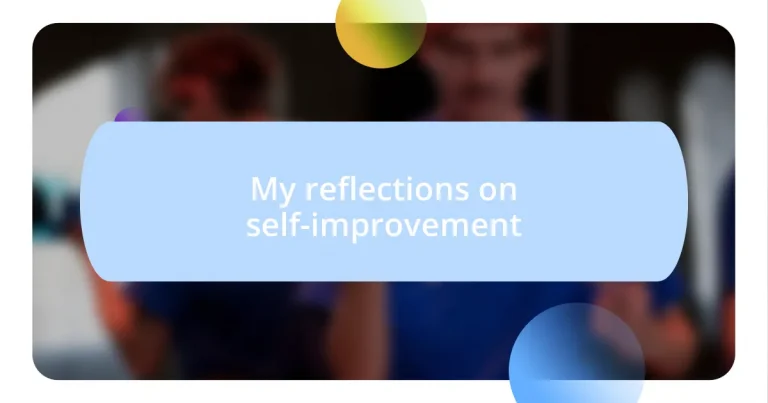Key takeaways:
- Self-improvement is a non-linear journey filled with setbacks that can lead to significant breakthroughs.
- Setting specific, actionable goals enhances motivation and focus, making larger objectives feel attainable.
- Tracking progress through journaling and digital tools fosters accountability and encourages reflection on growth.
- Celebrating achievements reinforces motivation and inspires continued efforts in the self-improvement journey.
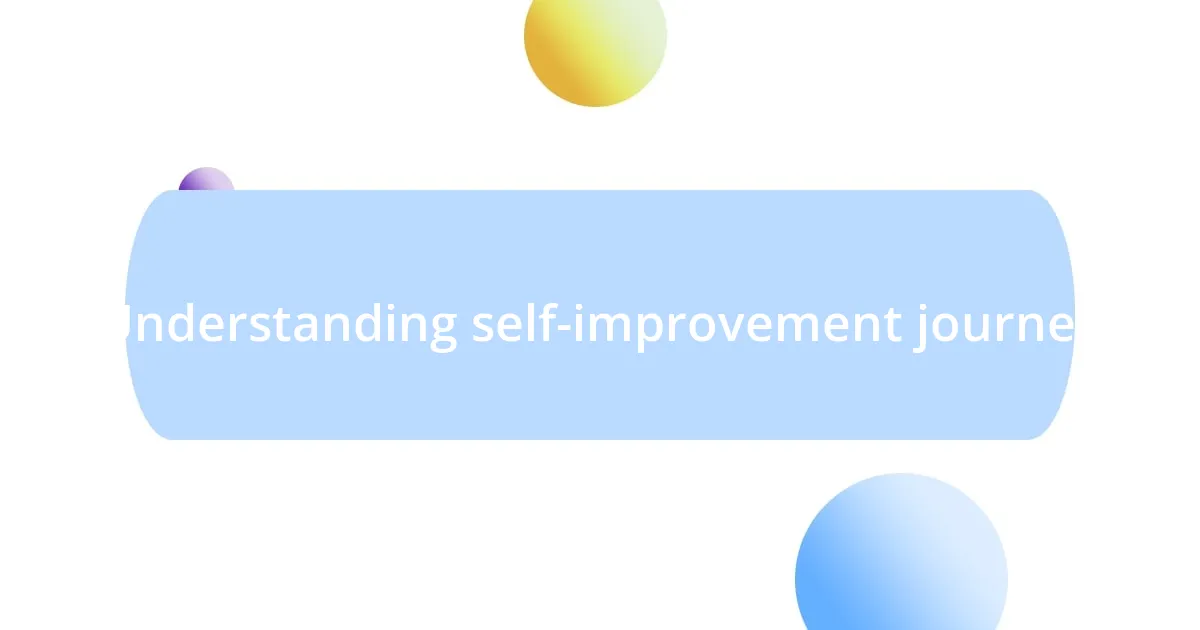
Understanding self-improvement journey
Understanding one’s self-improvement journey can feel like navigating through a dense fog, where every step forward reveals something new yet challenging. I remember a time when I struggled to maintain my fitness routine. Each morning, as I laced up my shoes, a little voice in my head asked, “Will today be the day I finally push through?” That uncertainty can be daunting, but it’s also part of the growth.
As I embraced the ups and downs, I realized that setbacks often laid the groundwork for breakthroughs. There were days when I’d falter and indulge in old habits, leaving me frustrated. But those moments of disappointment sparked deeper reflections; I would think, “What can this teach me?” Often, this led me to discover underlying triggers, allowing me to create more effective strategies for my path.
I’ve learned that self-improvement is not a straight line; it’s a winding road filled with twists, turns, and even detours. I still recall a time I worked tirelessly on a project only to receive critical feedback. Instead of feeling defeated, I asked myself, “How can I make this better?” This willingness to embrace feedback transformed obstacles into stepping stones on my journey. The road may be bumpy, but every twist offers a chance to learn and grow.
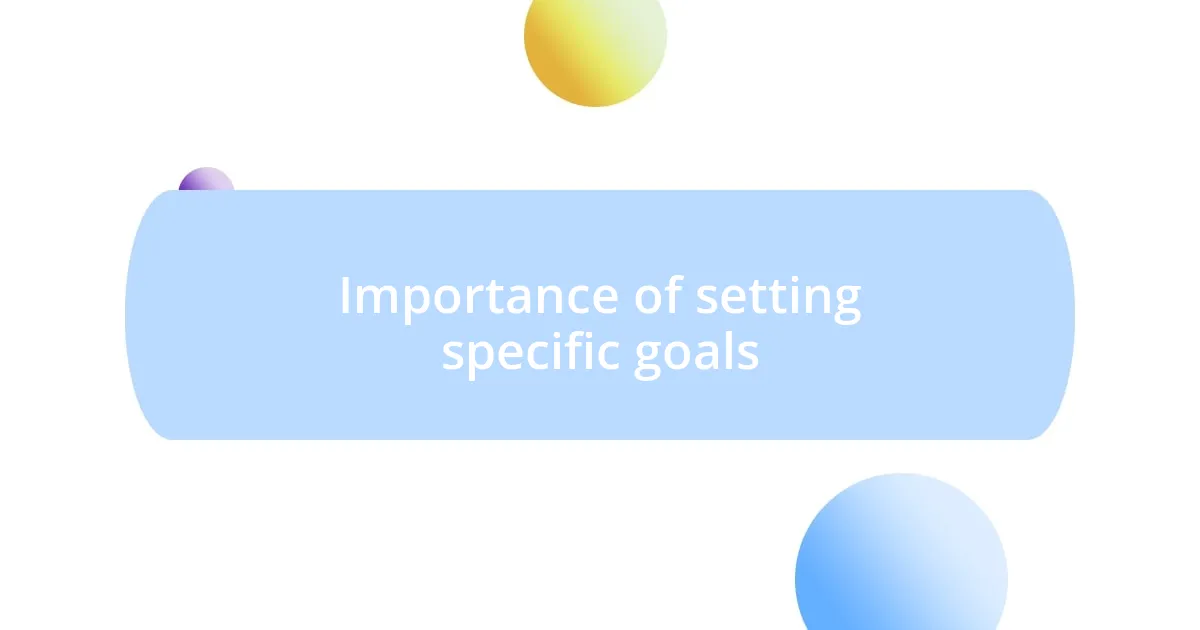
Importance of setting specific goals
Setting specific goals is a game changer in the self-improvement process. I remember a time when I decided to write a book. It seemed like an overwhelming endeavor until I broke it down into smaller, manageable steps—like completing one chapter a week. With each chapter I finished, I felt a surge of accomplishment that kept my motivation alive. These small victories made the bigger goal feel attainable.
When I think about goal-setting, I can’t help but reflect on the clarity it brings. Specific goals act like a roadmap; they direct our focus and provide a clear path forward. For instance, during my fitness journey, simply aiming to “get fit” became much more engaging when I specified, “I want to run a 5K in under 30 minutes.” This specific goal fueled my determination and made each workout have purpose, turning mundane training into an exciting challenge.
Moreover, I find that specific goals do more than just inspire action; they instill a sense of accountability. Recently, I set a goal to learn a new language. By committing to practice for just 15 minutes daily, not only did I track my progress, but I also felt a growing excitement as I completed each milestone. This approach keeps me involved and accountable, ensuring I don’t slip into complacency.
| General Goals | Specific Goals |
|---|---|
| Lack clarity and direction | Provide clear focus and purpose |
| Lower motivation | Boost engagement through measurable milestones |
| Harder to track progress | Easy to monitor and celebrate achievements |
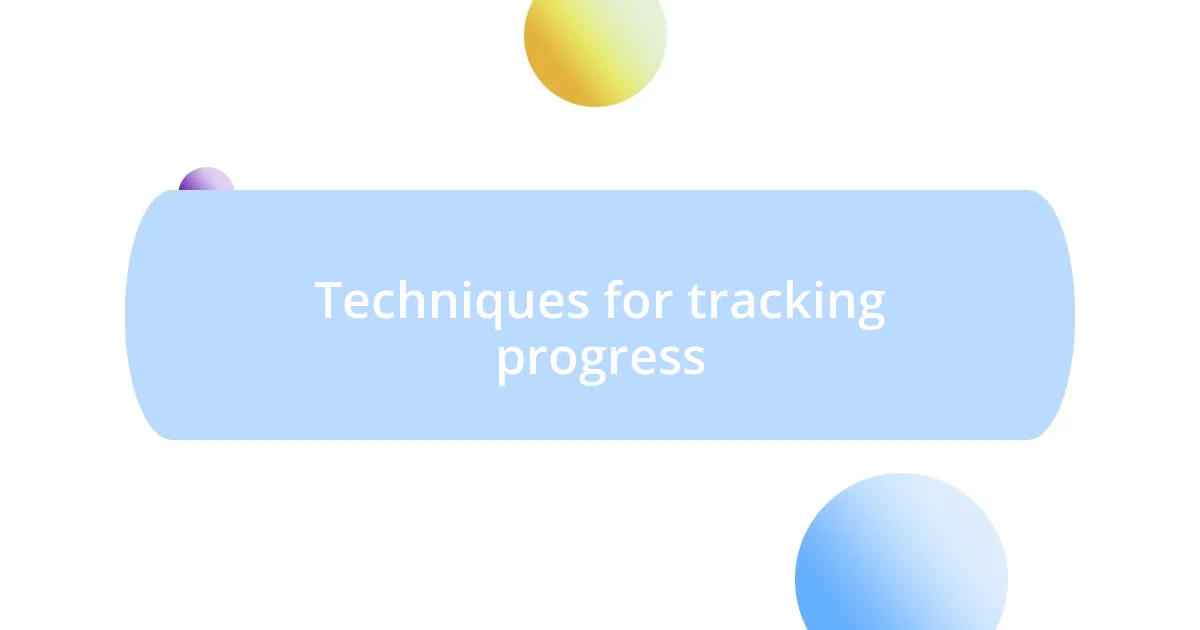
Techniques for tracking progress
Tracking progress in self-improvement is a vital technique that keeps me engaged and motivated. One method that has worked wonders for me is maintaining a dedicated journal. I’ve found that jotting down my daily achievements, no matter how small, creates a sense of accountability. Each entry serves as a snapshot of my growth, and looking back on my journey always fills me with pride and encouragement. It’s incredible how these written reflections can stir emotions and reinvigorate my commitment to my goals.
To complement journaling, I also utilize various digital tools and apps for tracking my progress. Here are some techniques I recommend:
- Habit Tracking Apps: I love using apps like Habitica or Todoist, where I can check off completed tasks and visualize my success.
- Progress Photos: In my fitness journey, capturing weekly progress photos allowed me to see transformations I might not notice in the mirror day-to-day.
- Regular Reviews: Setting aside time each month to assess my goals keeps me aligned with my aspirations and helps adjust strategies if necessary.
- Achievement Lists: I’ve started compiling lists of accomplishments, both big and small. This practice is a fantastic morale booster and reminds me of my capabilities.
- Accountability Partners: Sharing my goals with a friend or mentor adds a layer of responsibility, and celebrating each other’s milestones makes the process enjoyable.
Incorporating these techniques has made tracking progress less of a chore and more of a rewarding experience. Each method reflects my personality and unique journey, which adds an emotional layer to my self-improvement path.
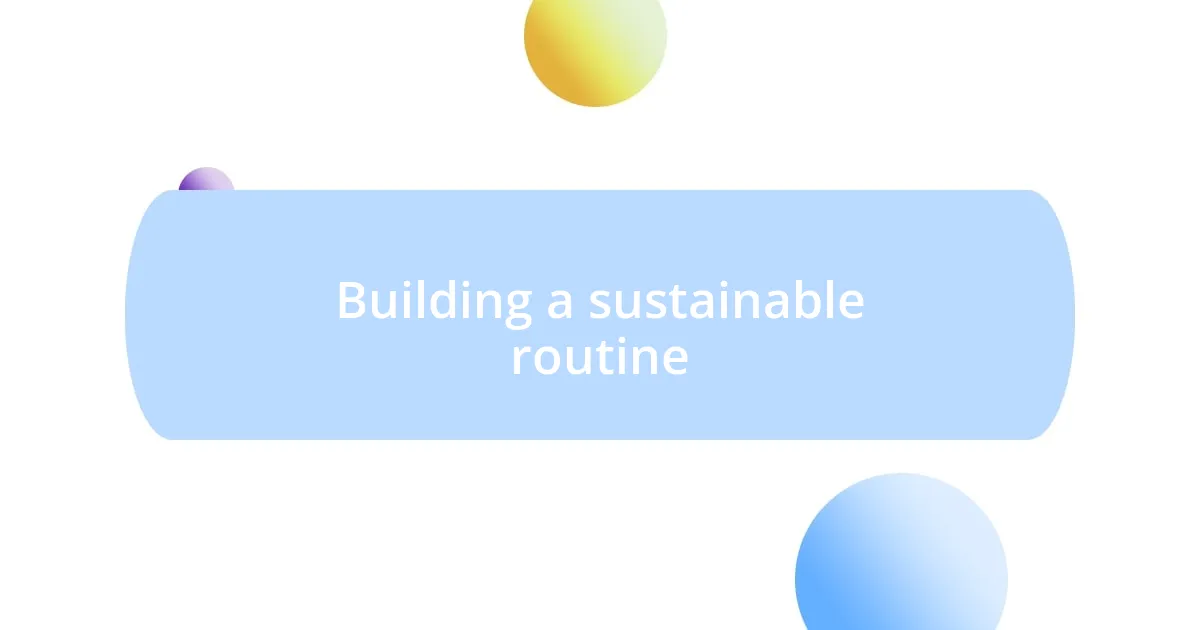
Building a sustainable routine
Creating a sustainable routine is something I’ve learned to prioritize in my self-improvement journey. I remember when I first attempted a morning routine; it started as an ambitious plan filled with lofty aspirations. However, I quickly found that trying to squeeze in too many activities left me feeling overwhelmed and defeated. Instead, I adjusted my approach, focusing on just two or three key habits that resonated with my lifestyle. This shift allowed me to build consistency and derive genuine enjoyment from the process.
I can’t emphasize enough how vital it is to listen to your body and mind when establishing your routine. There were days when I set a goal to wake up at 5 AM, only to find my energy levels slumping by mid-afternoon. I discovered that honoring my body’s natural rhythm not only improved my productivity but also reduced stress. It’s fascinating how adapting my schedule to match my energy peaks transformed my daily output. Have you ever considered how your own natural rhythms influence your performance?
As I continued refining my routine, I embraced the power of small, incremental changes. For instance, replacing my afternoon snack with a short walk became a refreshing ritual that boosted my mood and energy levels. Those moments of stepping away from my desk to enjoy fresh air helped clear my mind and refocused my thoughts. It’s these little adjustments that have not only made my routine sustainable but also enjoyable. I suppose the key is to experiment and find what genuinely uplifts you. After all, self-improvement should feel like a journey toward fulfillment, not a chore!
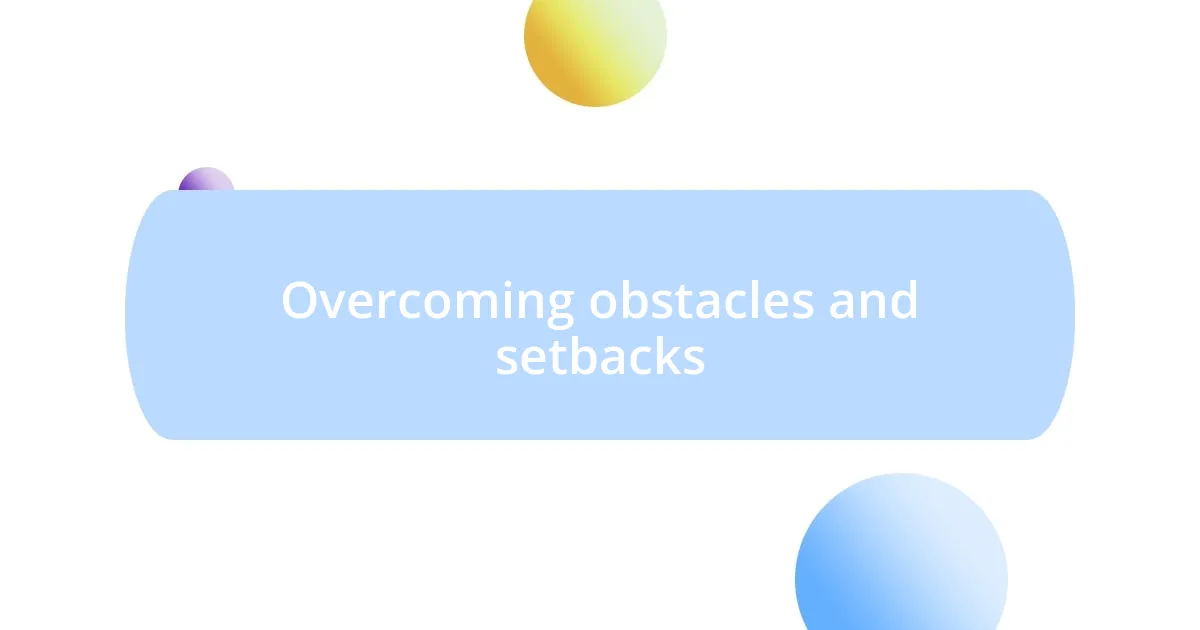
Overcoming obstacles and setbacks
When I look back at my journey, overcoming obstacles has been a crucial part of my self-improvement. I vividly recall a time when I faced a major setback at work—a project I had poured my heart into collapsed unexpectedly. It felt devastating. However, instead of wallowing in that defeat, I chose to analyze what went wrong. This reflection helped me develop resilience and adapt better strategies for future projects. Have you ever felt that sinking feeling when things don’t go as planned? I certainly did, but it also taught me that setbacks can be powerful teachers.
The path to self-improvement is rarely smooth, and I’ve learned that persistence is key. I remember trying to adapt a healthier lifestyle; there were weeks when I felt like I was making progress, only to be sidetracked by social events or fatigue. What helped me was embracing the idea of progress over perfection. I came to understand that every small step, even setbacks, were part of the process. Instead of punishing myself for a missed workout, I began to appreciate the small wins—like cooking a nutritious meal or simply choosing water over soda. It’s like sculpting a masterpiece; sometimes, you have to chip away at the imperfections to reveal the beauty within.
Emotional resilience really came into play during these tough moments. There were times I felt overwhelmed, caught in a cycle of self-doubt. I started practicing mindfulness, which helped me ground my thoughts and reflect on my feelings. One day, during a particularly challenging week, I pressed pause and took a quiet moment to breathe. In that stillness, I realized I was not defined by my failures but shaped by how I chose to respond to them. Have you realized the importance of checking in with yourself during stressful times? That awareness has often turned my setbacks into stepping stones on my path to growth.
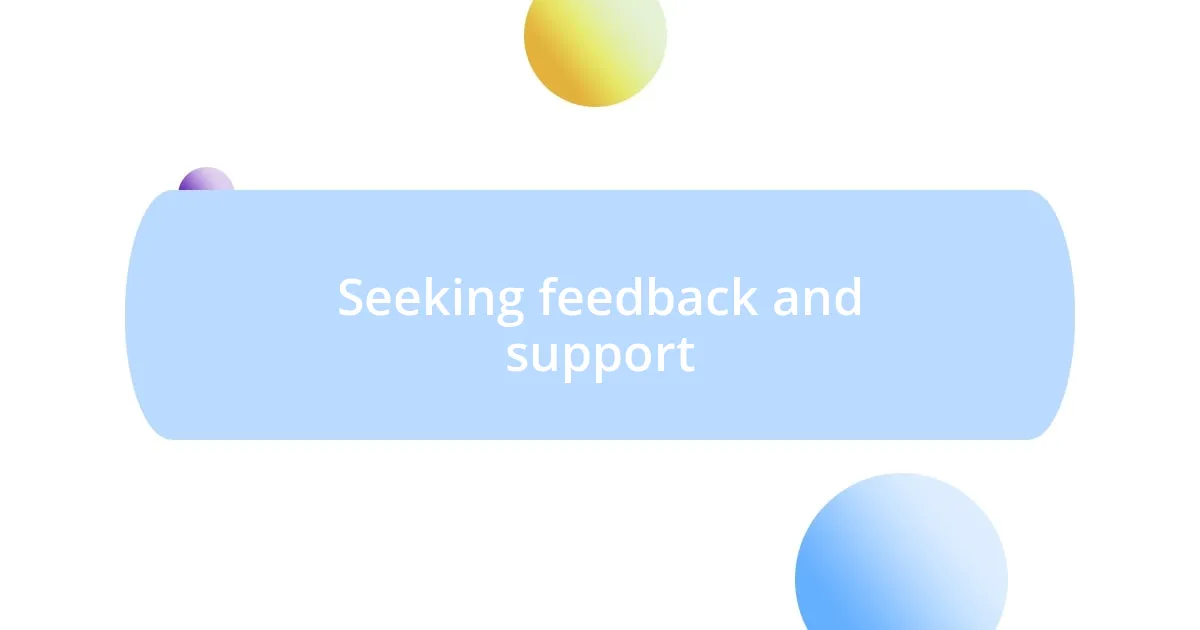
Seeking feedback and support
Seeking feedback has been a transformative aspect of my self-improvement journey. I distinctly remember a time when I drafted an article that I thought was brilliant, only to share it with a close friend who gently pointed out areas for improvement. Initially, I felt defensive, but as I reflected on their feedback, I realized it was a gift, showcasing perspectives I hadn’t considered. How often do we shy away from constructive criticism when it could be the very catalyst for growth?
Support systems play an equally vital role in this process. I found immense value in surrounding myself with like-minded individuals who encouraged my goals and aspirations. For example, during a tough period at work, I joined a peer group that met weekly to share challenges and celebrate small victories. It was remarkable how our shared experiences not only lifted my spirits but also sparked new ideas and solutions. Isn’t it interesting how collaboration can often light a spark of creativity we didn’t know we had?
Ultimately, I’ve come to appreciate that seeking feedback and support isn’t a sign of weakness; it’s a smart strategy for growth. There was a time when I hesitated to reach out for help, feeling I had to do everything alone. However, I eventually learned that asking for assistance or insights is an act of resilience. The connections I’ve forged through this practice have not only broadened my perspective but have also reinforced my commitment to continuous learning. Have you ever thought about how reaching out for support might open new doors in your self-improvement journey?
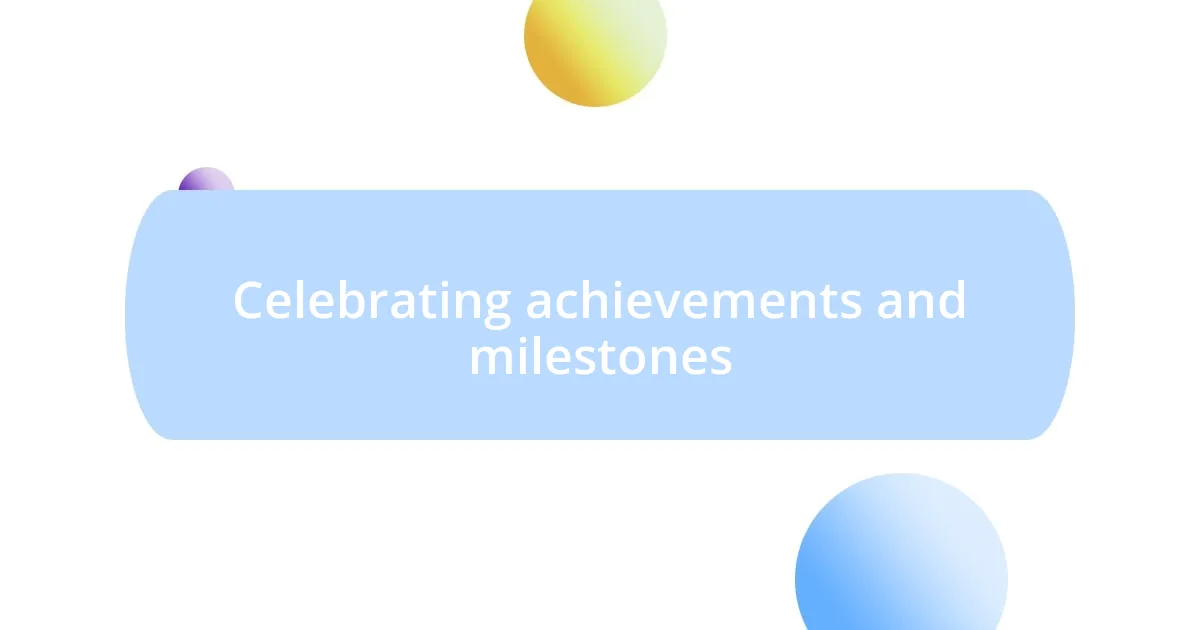
Celebrating achievements and milestones
Celebrating achievements and milestones is essential for maintaining motivation throughout the self-improvement journey. I remember the thrill of completing my first 5K after months of training. Crossing that finish line wasn’t just about the race; it was a validation of my dedication and hard work. Do you recall a moment when you achieved something you once thought impossible? Those triumphs remind us that progress is tangible, and we must honor them.
There’s something incredibly uplifting about sharing achievements with others. A few years back, I hosted a small gathering to celebrate a promotion I had worked tirelessly to earn. Surrounded by friends and family, I felt their joy for me—an affirmation that my efforts mattered. Isn’t it amazing how the act of sharing our milestones not only reinforces our own accomplishments but also inspires others to share theirs? It creates a nurturing environment where we can all thrive.
On a personal level, milestone celebrations serve as powerful reminders of why I strive for self-improvement in the first place. After successfully completing a challenging project, I took a moment to reflect on how far I had come. It was during that reflection that I felt a deep sense of pride and appreciation for my journey. What magical moments of reflection have you experienced after a significant achievement? I believe these moments highlight not just the outcome but the growth embedded in every step taken.












